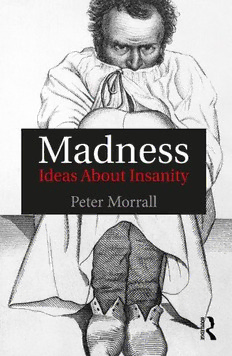
Preview Madness: Ideas About Insanity
Madness This book is an introduction to the uncertainties and incongruities about madness. It is aimed at all of those who are curious about this subject whether out of general inquisitiveness or because it is part of a formal course of study. Using real case studies in order to explain, humanise, and bring to life the subject, Peter Morrall critically analyses how madness has been and is understood, or perhaps misunderstood. By contrasting past and present people who have been perceived as mad and/or perceive themselves as mad, Morrall presents core ideas about madness and critiques their would-be robustness in explaining the specific madness of the person in question, as well as their general relevance to madness overall. Unlike many of its contemporaries, the book does not adhere to a perspective, but rather remains skeptical about the ideas of all who profess to understand madness, whether these emanate from sociology, psychology, psychotherapy, anthropology, ‘anti’ psychiatry, or the biological sciences of contemporary ‘scientific-psychiatry’. This book will inform and stimulate the thinking of the reader, and challenge those with preconceived ideas about madness. Peter Morrall is an Associate Professor of Health Sociology at the University of Leeds, UK, who focuses on constructive critiques of the meaning of madness, madness and murder, and psychotherapy. He also rides motorbikes, sings, and plays the saxophone, but (so far) not all three at once. Madness Ideas About Insanity Peter Morrall First published 2017 by Routledge 2 Park Square, Milton Park, Abingdon, Oxon OX14 4RN and by Routledge 711 Third Avenue, New York, NY 10017 Routledge is an imprint of the Taylor & Francis Group, an informa business © 2017 P. Morrall The right of Peter Morrall to be identified as author of this work has been asserted by him in accordance with sections 77 and 78 of the Copyright, Designs and Patents Act 1988. All rights reserved. No part of this book may be reprinted or reproduced or utilised in any form or by any electronic, mechanical, or other means, now known or hereafter invented, including photocopying and recording, or in any information storage or retrieval system, without permission in writing from the publishers. Trademark notice: Product or corporate names may be trademarks or registered trademarks, and are used only for identification and explanation without intent to infringe. British Library Cataloguing-in-Publication Data A catalogue record for this book is available from the British Library Library of Congress Cataloging in Publication Data Names: Morrall, Peter author. Title: Madness : ideas about insanity / Peter Morrall. Description: Milton Park, Abingdon, Oxon ; New York, NY : Routledge, 2017. Identifiers: LCCN 2016046394| ISBN 9781138905511 (hbk) | ISBN 9781138905528 (pbk) | ISBN 9781315695839 (ebk) Subjects: LCSH: Mental illness--Case studies. | Mentally ill--Case studies. Classification: LCC RC465 .M68 2017 | DDC 616.89--dc23 LC record available at https://lccn.loc.gov/2016046394 ISBN: 978-1-138-90551-1 (hbk) ISBN: 978-1-138-90552-8 (pbk) ISBN: 978-1-315-69583-9 (ebk) Typeset in Bembo by HWA Text and Data Management, London In memory of my mother Sheila Morrall and friend Ray Graham (neither cuius erant copiose sanus) Contents Acknowledgements viii Introduction 1 1 Madness manufactured 12 2 Incarceration and control 46 3 Sane insanity 80 4 Insane society 115 5 Science and psychiatry 152 Conclusion 187 Bibliography 191 Index 218 aCknowledgeMents Thank you to the editorial staff at Routledge, in particular Grace McInnes, Louisa Vahtrick, Carolina Antunes and Ed Needle for their support and patience, to colleagues and friends Pauline Philips, Gordon Teal, Karl Jarvis, Siobhan Hugh- Jones and Mike Hazelton, for their corrections and encouragements. Thank you also to the huge number of students from many different disciplines who have participated in my ‘madness’ courses over the last twenty years at Leeds University. IntroduCtIon They called me mad, and I called them mad, and damn them, they outvoted me. Nathaniel Lee, 1684, quoted in Porter, 1987, p.3 Nathaniel Lee was a moderately well-known seventeenth-century playwright who became more well-known for the above pithy insight that madness may not be all it seems. The intention of this book is to present and scrutinise a selection of past and present ideas,1 including those of the mad themselves, which purport to understand madness. The book is aimed at those for whom the subject of madness is part of a course of study, for example, in sociology, anthropology, psychology, psychotherapy, psychiatric/mental health nursing, general medical practice and psychiatry. It is also of relevance to anyone else who is curious about this subject. The idea of madness held by Nathaniel Lee seems to be that what madness is and who is mad depends on the eye of the beholder. In his case, the beholders not only voted him mad but incarcerated him for five years in the London madhouse of ‘Bedlam’ (Porter, 1987). Here he was ‘blistered’. Blistering consisted of shaving off the patient’s head-hair and applying substances such as mustard powder to inflame the skin in an attempt to re-balance his ‘humors’. Humors are the bodily fluids thought by the Ancient Greeks to be responsible for four modes of temperament: miserableness (melancholic), irritability (choleric), peaceable (phlegmatic), and optimistic (sanguine). What his physician, Edward Tyson, hoped was that Lee’s madness would be drawn out of him through the pus which formed when the blisters became infected. Eventually discharged from Bedlam he was to die at the age of 43 years having been run over by a coach after falling over in the street while drunk (Arnold, 2008). As early as the eighth century in the Islamic world, there were institutions which accepted the insane. These were elementary hospitals called ‘maristans’
